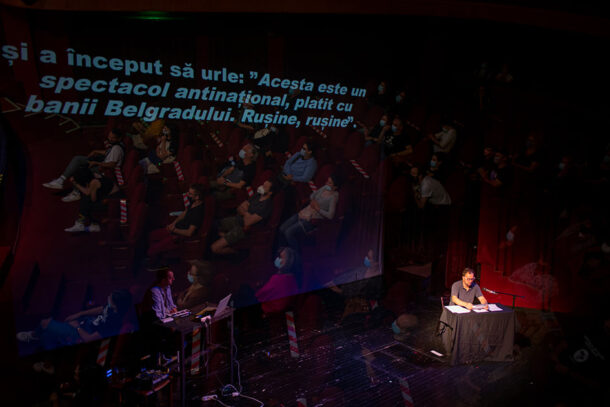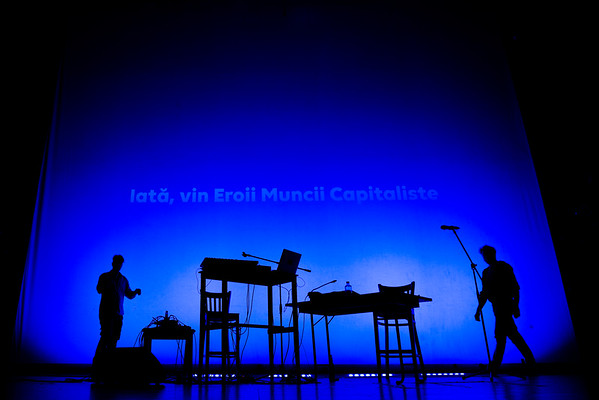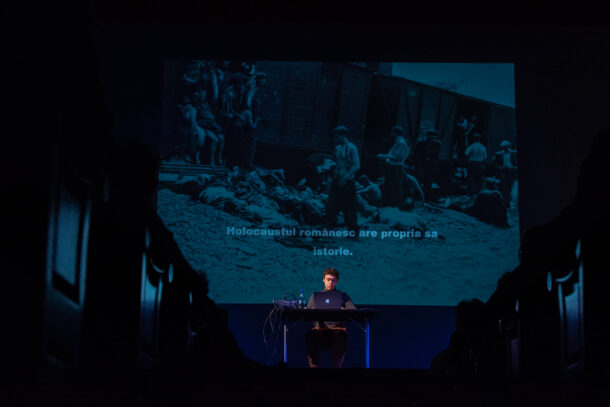By Oana Cristea Grigorescu
The present is a floating notion nowadays, subject to postponement, suspension, reconfiguration, under the circumstances of restrictions imposed on theatres by health security measures. The seasons, festivals, premieres of 2021 have been scheduled under the threat of last minute changes. The Piatra Neamț Theatre Festival (3-12 September), organized for 32 editions by the local Youth Theatre (TT), returned after the break in 2020, proposing a theme that focuses on the characteristic of the time: Post-present. The post prefix, which has generated artistic trends in opposition to the original isms, fights the insecurity of the present by contemplating the challenges of the global world. Post-present is imposed as a federating term in the artists’ offer to discuss and performatively reflect the new social, cultural, global realities.
Celebrated as a place of renewal and revival of aesthetic formulas in the Romanian theatre, the Piatra Neamț Theatre Festival has consistently proposed – since 2017, when stage director Gianina Cărbunariu took over the management of TT – a critical reflection of the issues of Romanian society and the global one in performances involved in the local community, interested in re-evaluating the past, in criticising neo-liberalism and educating young audiences. These constants were present in the selection of the recently concluded edition of the festival, with face-to-face performances in the theatre hall and in open spaces around the city.
Perhaps the most challenging, but also the most perturbed by the pandemic context was the international section of the festival, entitled Something to Declare & to Share. Due to the reintroduced physical borders between countries, the productions in the section were presented as performative readings. In the absence of actors, the playwrights and directors were invited to summarize the missing show, to “declare the immaterial cultural assets” with which they transgress, the borders drawn by the pandemic waves by their presence in Piatra Neamț.

One Flew Over the Kosovo Theatre, by Jeton Neziraj. Photo: Piatra Neamț.
I watched three such readings that proved most convincing thanks not only to their socio-political themes but also to the illustrated presentation with excerpts from the absent show or audio-video interventions followed by discussions with the audience.
One Flew Over the Kosovo Theatre, presented by playwright Jeton Neziraj, director and founder of the independent company Qendra Multimedia in Pristina, commented on the concept and impact of the performance that drew a bridge of cultural communication between Kosovo and Serbia after the secession crisis. Preparing for the premiere, public actions imbued with parodic humor and acidic irony sought to undermine the ultranationalist political climate in Kosovo’s young state. Political theatre intervenes in the social breach caused by the separation from Serbia, and Jeton Neziraj’s play uses theatre to prove that regardless of political ideologies, culture remains a lingua franca. Appreciated as the most representative political author in the Balkans today, the playwright is internationally acclaimed and will be awarded with the “EuropeCultureAward 2020/21” prize which he will receive in November.

Heroes of Capitalist Labor, composed by Jindřich Čížek, directed by Michal Hába. Photo: Piatra Neamț.
From the Czech Republic, the documentary-based show produced during the pandemic, Heroes of Capitalist Labor, was summarized by director Michal Hába and composer Jindřich Čížek by reading short scenes illustrated with live music. An international co-production of several theatres including Prague City Theatres, Berliner Volksbühne and TT (as part of the POSTWEST project), the show’s title plays with the name of a popular medal offered to top workers in socialist countries: hero of socialist work. The themes of inequitable working conditions and the capitalist exploitation of the activity of the “essential workers” overlap with the precarious status of self-employed actors, aggravated during the 2020/21 pandemic years. Heroes of Capitalist Labor is a critique of the political class, but also of union disarticulation and the dissolution of the employees’ class consciousness in the capitalist economy. The form of musical entertainment is misleading – it is the social message that is the real center of the show.
The third reading was entitled “MUSEUM OF THE ROMANIAN HOLOCAUST, a story better left unsaid again.” It was presented by Jakub Skrzywanek, its young Polish director. Actually, he was invited to TT in 2020 to direct The Cremator by the Czech writer Ladislav Fuks, as the final part of the “Violence Triptych.” The production was suspended due to the pandemic, though, so now he did this performative reading in which he associated two different sources: documentary information about the pogrom of the Jews of Moldova and pages from the diary of the Romanian writer with Jewish origins Mihail Sebastian. The pages from the diary included in the reading record the breakup of the friendship between Sebastian and Mircea Eliade due to the anti-Semitic convictions of the latter.

MUSEUM OF THE ROMANIAN HOLOCAUST, a story better left unsaid again, directed by Jakub Skrzywane. Photo: Piatra Neamț.
Several more Festival entries focused on the pogrom: Radu Jude’s film The Exit of the Trains, the TT production Future in the Past by Clemens Bechtel and the documentary production Gewald in Darabani (“Texte bune în locuri nebune” Company). All of them re-evaluate history from subjective, yet well documented perspectives and search for the causes of anti-Semitism through a documentary recovery of the tragedy of the expulsion and extermination of the Jewish population in Romania throughout history.
In the section of Romanian performances, grouped under the title See you outside, there were two productions inspired by Titanicul, the story of Romanian writer Florin Lăzărescu, a text with a deep metaphysical background fueled by the theme of death. While Titanic at the Municipal Theater “Matei Vişniec” in Suceava (directed by Cosmin Panaite) merely illustrates the narrative vein by the visual and acting exploration of the misery and lack of perspective of rural life, the second show, produced by ”Frilensăr”Bucharest cultural platform (directed by Daniel Chirilă) is truly an asset. The title of the latter – alcohol, light and a little death: a case study – perfectly connects the drama of the characters with the melancholy of extinction. The musical extension of the story maintains a sensitive balance between the rough realism of the text and the gradual immersion into the melancholy of death. The first part of the show musically supports the story through the surprising variety of sounds produced by original instruments, only to convert in the second part into a musical incursion of folklore extraction into Romanian fatalism. The combination of musical and vocal skills and the performing talent of the actors in the production were applauded, recognized and given an award, by the way, by the Teenagers’ Jury.

Other selected shows highlighted burning acute topics of Romanian society, such as illegal deforestation and corruption in Green Felled (“Pro Teatru” Association, Zalău), labour exploitation in Delivery Rider Bucharest (Masca Theatre, Bucharest) and The Field of Struggle (unteatru, Bucharest) or abandoned children and the generational gap in Pattern (TT, Piatra Neamț).
Two performances of the newest production signed by Gianina Cărbunariu at TT (TO BE CONTINUED. On the Planet Mirror), presented at the beginning and the end of the festival, served as its frame. The production is a bitter socio-political critique in the form of musical entertainment adjusted as a SF story. The audience placed outside, in front of the entrance of the theatre, watches the occupation of the building by aliens who present themselves at the colorful windows of the building. We are offered possible versions of life, led by the governing programs of the city’s occupiers, the aliens. The several legislatures, each lasting not longer than a few minutes, are in effect critical commentaries on our own distractions in our terrestrial civilization. The inventiveness of the costumes and the glamour of the lights (Dorothee Curio scenography), the soundtrack (Alex Halca) and the video design (Andrei Cozlac) create a seductive dystopian universe to everyone’s taste – the audience as well as those who happen to pass by at the time of the performances.
The Piatra Neamț Theatre Festival invited us to look at the present from the view-point of the future and to become more responsible to the next generations. The post-present thus became the expression of awareness of the social, political, climatic challenges of our time. The selection of the festival reminded us that the theatre has always crossed cultural, ideological, social borders and on the Planet Mirror of the stage, artists have always been the source of visions about the world of tomorrow.
Oana Cristea Grigorescu is a theater critic and radio drama producer for Radio Romania. Holder of a PhD in Music from the Music Academy from Cluj (2011), she is also member of UNITER (The Theatrical Union from Romania) from 1997. Since 2016, she has been dedicated to the production of radio drama at Radio Drama Dpt. of Radio Romania with internationally awarded productions.
As a theater critic she regularly contributes cultural articles and studies in magazines Scena.ro, Observator Cultural, Capital cultural, and www.liternet.ro portal, or in the annual bilingual volumes coordinated by Oltiţa Cântec (2015-2021). In 2020 she received the UNITER award for theater criticism. In 2021 she is the artistic director, along with two other theater critics, of Romanian National Theater Festival.

European Stages, vol. 16, no. 1 (Fall 2021)
Editorial Board:
Marvin Carlson, Senior Editor, Founder
Krystyna Illakowicz, Co-Editor
Dominika Laster, Co-Editor
Kalina Stefanova, Co-Editor
Editorial Staff:
Alyssa Hanley, Assistant Managing Editor
Emma Loerick, Assistant Managing Editor
Advisory Board:
Joshua Abrams
Christopher Balme
Maria Delgado
Allen Kuharsky
Bryce Lease
Jennifer Parker-Starbuck
Magda Romańska
Laurence Senelick
Daniele Vianello
Phyllis Zatlin
Table of Contents:
- Berliner Theatertreffen Fights to Survive as Live Theatre Adapts to World Conditions by Steve Earnest
- Cultural Passport for Piatra Neamț Theatre Festival 2021 by Oana Cristea Grigorescu
- We See the Bones Reflected: Luk Perceval’s 3STRS in Warsaw, 2021 by Chris Rzonca
- Festival Grec 2021 by Maria Delgado and Anton Pujol
- Report from London (November – December, 2019) by Dan Venning
- A National Theatre Reopens by Marvin Carlson
- In Memoriam: Mieczysław Janowski, 1935 – 2021 by Dominika Laster
- In Memoriam: Jerzy Limon, 1950–2021 by Kathleen Cioffi
- In Memoriam: Marion Peter Holt
www.EuropeanStages.org
europeanstages@gc.cuny.edu
Martin E. Segal Theatre Center:
Frank Hentschker, Executive Director
Marvin Carlson, Director of Publications
©2021 by Martin E. Segal Theatre Center
The Graduate Center CUNY Graduate Center
365 Fifth Avenue
New York NY 10016
European Stages is a publication of the Martin E. Segal Theatre Center ©2021



